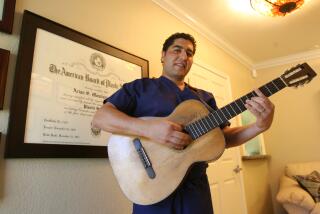State Drops Case Against Doctor; He’ll Stop Suits
- Share via
State medical officials, citing an inability to prove their case, have agreed to drop all allegations of negligence and incompetence against Dr. Ron Lapin, an Orange County surgeon who became nationally known for his treatment of Jehovah’s Witnesses by so-called “bloodless surgery.”
In return, Lapin agreed to drop state and federal lawsuits seeking more than $40 million in damages for alleged violations of his civil rights during the 4-year-old state investigation of his practice.
“My purpose was to clear Dr. Lapin, and he has been totally vindicated,” said Frank P. Barbaro, the physician’s attorney. “If they (state officials) had something to substantiate this, they could have put on their case.”
Doctor Was ‘Devastated’
When the accusations were filed in 1981, Lapin was “devastated,” Barbaro said, adding that the doctor eventually lost more than half his practice. Now practicing in Norwalk, the surgeon “has been doing well again,” the attorney said.
Lapin, who is presently in Thailand, could not be reached for comment.
Kenneth Wagstaff, director of the Board of Medical Quality Assurance, the state agency that polices medical practice, said Thursday that the agreement was reached after lawyers for the attorney general’s office advised that “there was not enough evidence to sustain the original accusations.”
Lapin, whose license to practice medicine has never been revoked or suspended, had been accused of gross negligence, ordering unnecessary surgery, incompetence and repeated negligent acts, after a board investigation.
The 1981 accusations by the state included allegations that Lapin had performed a hysterectomy on a woman with a normal uterus, tubes and ovaries and surgery on a man whose gall bladder was removed even though it was normal. Another alleged incident involved a hysterectomy on a woman after a written diagnosis of internal bleeding, even though other records indicated no internal bleeding.
Such accusations, however, must be proven with “clear and convincing evidence to a reasonable certainly,” a standard that state lawyers concluded could not be met, Wagstaff said.
The state decision last month to withdraw its accusations against Lapin is unusual. In the year ending last June, just six out of 116 cases against physicians considered by the agency were dropped. During that period, accusations were found to be justified in 10 cases. The remaining hundred cases resulted in revocation, suspension or surrender of a medical license.
Bloodless Surgery
Lapin’s practice involving bloodless surgery--of benefit to Jehovah’s Witnesses, who refuse to accept blood transfusions on religious grounds--is “controversial,” Wagstaff said. But his agency could not assemble sufficient medical evidence to support the charges, he said. “You need a solid outside medical expert, and we couldn’t find one,” Wagstaff explained.
Lapin developed surgical techniques that minimized blood loss, procedures that Barbaro said “have saved hundreds of lives of people nobody else would touch.”
“People who would have been left to die were sent to Dr. Lapin. He would perform very rapid surgery, contain the blood loss and save lives of people who had absolutely no chance,” the attorney added.
The 45-year old Lapin, who is not a Jehovah’s Witness, had been a leading surgeon at Esperanza Hospital in Yorba Linda, when a state health investigation into the hospital’s surgical practices forced the ouster of the facility’s management and led to its being taken over by St. Jude Hospital in nearby Fullerton.
In one of his lawsuits, Lapin alleged that when he moved his practice to Bellflower City Hospital, the state began an investigation of that facility as well.
Nearly ‘a Record’
Referring to the state investigation of his client, Barbaro called it “damn close to a record in terms of length of time.”
Al Korobkin, supervising deputy attorney general who handled the settlement, said Thursday that several years had been taken up in settlement negotiations. The state attorney general’s office routinely supplies legal counsel to the board in proceedings involving medical licenses.
“What took a long time were extensive discussions about possible settlements,” Korobkin said Thursday.
Wagstaff said lawyers from the attorney general’s office advised that it would be “futile, time consuming and expensive to pursue” the Lapin case.
“I can’t be judge, jury and executioner. That’s not my job,” he added.
More to Read
Sign up for Essential California
The most important California stories and recommendations in your inbox every morning.
You may occasionally receive promotional content from the Los Angeles Times.












